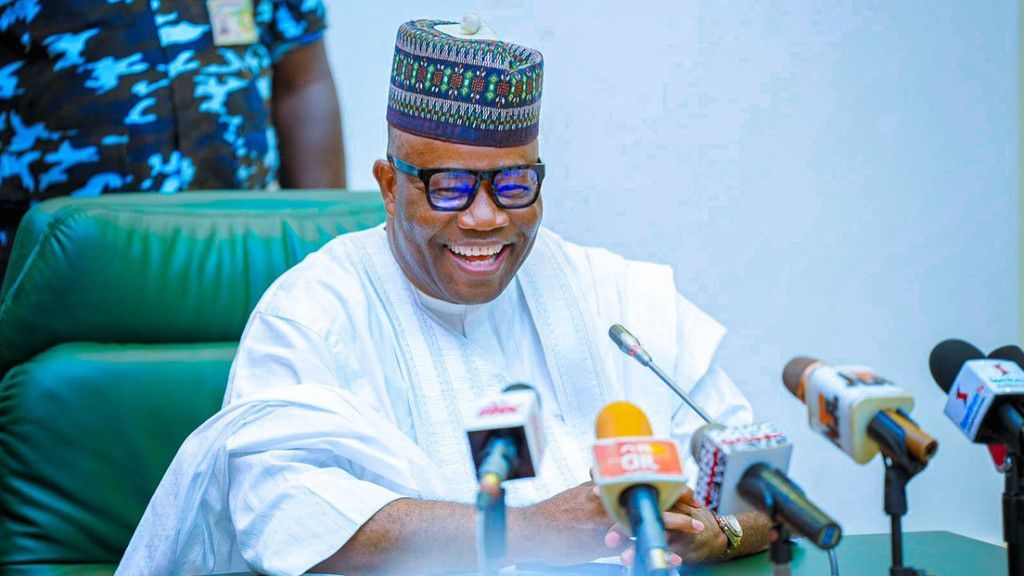
The Senate, on Thursday, passed for second reading of the 2025 Appropriation Bill of N49.7 trillion.
The News Agency of Nigeria (NAN) reports that the appropriation bill was presented to the joint session of the National Assembly by President Bola Tinubu on Wednesday.
The passage of the bill for a second reading followed the presentation of its general principles at plenary on Thursday by the Majority Leader, Senator Opeyemi Bamidele (APC-Ekiti).
Leading the debate on the general principles, Bamidele said that the bill was deemed to have been read the first time when it was laid before the joint session of the national assembly.
He said that the bill sought to authorise the issuance of N49.7 trillion out of the Consolidated Revenue Fund of the federation for the 2025 fiscal year.
Bamidele said: “The 2025 budget proposal christened, “Budget of Restoration: Securing Peace, Rebuilding Prosperity,” strikes at the very core of the Renewed Hope Agenda.
“It demonstrates this administration’s commitment to stabilising the economy, improving lives and repositioning our country for greater performance.
“The 2025 budget has seen a significant increase of 74.18 per cent, reaching N47.9 trillion in nominal terms, signalling a bold fiscal strategy aimed at addressing persistent infrastructure gaps and development challenges.
“However, in dollar terms, the budget contracted by 23.22 per cent, dropped from 36.7 billion dollars in 2024 to 28.18 billion dollars in 2025.
“This reduction in real value limits the potential impacts of the budget on economic growth and the well-being of the population.
“What remains for us is to closely examine the contents and the details to sort things out and smoothen the rough edges.”
Bamidele listed the budget highlights to include: an oil price benchmark of 75 dollars per barrel, a daily oil production estimate of 2.06 million barrels per day and an exchange rate of N1,500 to a dollar, with the inflation rate standing at 15.75 per cent.
Contributing, Senator Abdul Ningi (PDP-Bauchi) expressed optimism about the budget, emphasising the critical role of the national assembly in shaping it to address the nation’s challenges.
He said that while the president had presented his proposals, the real question lay in what the parliament could do to refine the proposal for the benefit of Nigerians.
Ningi stressed the need for prioritising outcomes that would improve citizens’ lives, such as addressing hunger, economic hardship and security concerns.
He described security as the foundation for progress, urging the president to devote significant attention to it.
“As a parliament, it should not be about what the president brought; it should be about what the parliament can do with what the president brought,” he said.
In his contributions, Senator Tahir Monguno (APC- Borno) said that the protection of lives and property was the fundamental responsibility of any government.
Monguno said that the allocation of N2.6 billion to infrastructure was a significant step toward economic development, saying that it had the potential to generate a multiplier effect.
He, however, expressed concern that without effective implementation, such allocations would remain mere projections, with no tangible impacts on citizens’ lives.
The senator urged the executive arm to prioritise budget implementation, referencing the president’s recent disclosure that only 48 per cent to 50 per cent of the current budget had been executed.
He called for a significant improvement, suggesting that implementation levels should reach at least 80 per cent or 90 per cent.
Senator Adams Oshiomhole (APC-Edo) said that security was critical to national development, stressing that no sector could thrive without it.
He lauded the allocation to defence, emphasising that it reflected the nation’s pressing need to address insecurity.
Oshiomhole called for a shift in defence policies and procurement strategies, advocating for a stronger focus on technology to enhance security capabilities.
Senator Asuquo Ekpenyong (APC-Cross River) said that the budget should include provisions for the South-West Development Commission.
Also, Senator Victor Umeh (LP-Anambra) expressed concern over what he called the omission of the Port Harcourt-Maiduguri eastern railway line in the budget.
Umeh, while acknowledging the plans to construct the Sokoto-Badagry and Lagos-Calabar highways, stressed the importance of the eastern rail line, which he had previously championed through a motion co-sponsored by 35 senators.
He urged his colleagues to ensure that the eastern rail line was included in the detailed budget breakdown.
In his remarks, President of the Senate, Godswill Akpabio, thanked his colleagues for their contributions to the general principles of the 2025 appropriation bill.
He urged the lawmakers responsible for the various ad-hoc committees to get their reports ready upon resumption in January.
NAN reports that the senate, thereafter, adjourned plenary till January 14, 2025, for the Christmas and New Year celebrations.